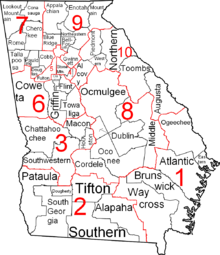
The Superior Court is Georgia's general jurisdiction trial court. It has exclusive, constitutional, authority over felony cases, divorce, equity and cases regarding title to land. The exclusive jurisdiction of this court also covers such matters as declaratory judgments, habeas corpus, mandamus, quo warranto and prohibition. The Superior Court corrects errors made by lower courts by issuing writs of certiorari; for some lower courts, the right to direct review by the Superior Court applies.
YouTube Encyclopedic
-
1/3Views:18 3069315 338
-
Worcester v. Georgia Supreme Court Case
-
Bond Hearings in Georgia Criminal Cases
-
Ryan Duke: Georgia Supreme Court Arguments
Transcription
Organization
Superior Courts are organized into 10 Judicial Districts, comprising 50 judicial circuits. Each county has its own Superior Court, though a judge may serve more than one county. A chief judge handles the administrative tasks for each circuit.
There is a business court in the Fulton County (Atlanta) Superior Court, the Metro Atlanta Business Case Division. This complex business litigation case track was created by court order in 2003,[1] and it is distinct from the later constitutionally created Georgia State-wide Business Court.
Election of judges
Superior Court judges are elected to four-year terms in nonpartisan, circuit-wide races. To qualify as a Superior Court judge, a candidate must be at least 30 years old, a citizen of Georgia for at least three years, and have practiced law for at least seven years. Superior Court judges who have retired and taken senior status may hear cases in any circuit at the request of a local judge, an administrative judge, or the governor.[2]
See also
References
- ^ Mitchell L. Bach and Lee Applebaum. "A History of the Creation and Jurisdiction of Business Courts in the Last Decade, 60 Bus. Law. 147 (2004)" (PDF).
- ^ "The Superior Courts of Georgia". Archived from the original on 19 July 2011. Retrieved 26 June 2011.
